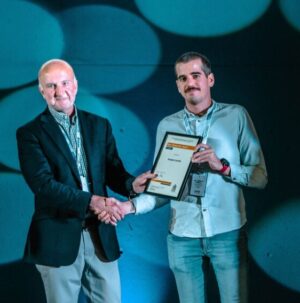Firms and employees can benefit from information diffusion through social connections at other firms. Therefore, co-worker networks observed in collaborative projects or assumed from job co-occurrence have been analyzed in a wide literature ranging from management to economics, and economic geography. Yet, beyond case-studies, the actual information flows are seldom identifiable in these networks and previous focus on firm- or employee benefits was mainly limited to dyadic relations across firms. To address this gap, we simulate co-worker networks within firms from large-scale administrative data, for which we use parameters fitted to information networks that we collected with a survey and from social media profiles. Then, following all individuals through job moves over their career, we establish the dynamic co-worker network across firms of the entire ICT industry in Sweden. Fixed-effect regression models suggest that growth of average income is significantly higher in those firms that have diverse connections but are central to the network as well. We find that large firms benefit more from triadic closure in the co-worker network, stressing the role cohesive relations in sharing complex knowledge. Our results highlight that firm growth is embedded into the eco-system of co-worker networks that facilitate information flows across firms.










